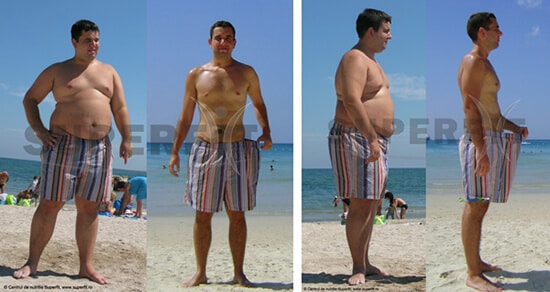Choose your online nutrition program!
I offer you a fast and efficient solution, for which you do not have to move from home!
ROMANIAN and ENGLISH

I am Dr. Șerban Damian, the nutritionist of the Superfit Center in Bucharest and I will be with you personally during your online weight loss, weight gain or sports nutrition program.
I have been providing nutrition consulting for more than 15 years and I have helped thousands of people achieve their goals. In parallel with the activity in the clinic, I promoted a healthy and balanced lifestyle through articles in the press, through numerous appearances on TV, radio and online, by participating in various events and scientific conferences as a speaker.
I will support you with professionalism and friendship, on the road to the dream figure and the desired well-being!
Are you undecided? Need more information?
You can write to me at serban.damian@superfit.ro or click on the green button below to talk on the phone (normal rate number)..
Why choose online consulting?
- You quickly receive a personalized weight loss / weight gain / sports nutrition program.
- No need to move, everything is done in front of the computer or phone.
- Prices lower than at the clinic by up to 40%.
- Health, first of all – You will eat healthy foods and you will learn how to make your own meals so that you maintain a proper weight in the long run
- No hunger, pills, teas or absurd diets – We only use methods with scientifically proven efficiency that do not endanger your health
- You can apply the complete nutrition and training program at home, without special expenses.
- Periodic monitoring by email or Skype / Zoom / Whatsapp as you prefer.
FIND OUT IN THIS VIDEO HOW THE ONLINE CONSULTING WORKS
EMAIL CONSULTING
- You choose the consulting package you want and make the payment on account or with card.
- Fill in the online questionnaire about your lifestyle, diet, exercise, health, food preferences, body measurements.
- You send me blood tests (if you have any).
- compile the file with recommendations and send it to you by email. This file contains personalized diets, nutritional supplement recommendations, exercise program, nutrition and weight loss guidelines.
- You start applying the recommendations.
- Every week you email me the food diary, and I give you quick feedback. The monitoring period extends over 1, 2 or 3 months.
- You enjoy the results! 🙂
SKYPE / ZOOM / WHATSAPP CONSULTING
- You choose the consulting package you want and make the payment in an account or by card.
- We set up the first online consultation, lasting 30 minutes, on Skype, Zoom, Whatsapp or phone. In this video or audio consultation I will gather key data about your lifestyle, health, size, diet, exercise, etc.
- You send me blood tests (if you have any).
- I compile the file with recommendations and send it to you by email. This file contains personalized diets, nutritional supplement recommendations, exercise program, nutrition and weight loss guidelines.
- Start applying the recommendations.
- Every week you email me the food diary, and I give you quick feedback. Every 2 weeks we set up an online meeting, lasting 20 minutes, on Skype, Zoom, Whatsapp or phone. The monitoring period extends over 1, 2 or 3 months.
- Enjoy the results!
TO FIND OUT IF YOU NEED TO LOSE WEIGHT,
CALCULATE YOUR BODY MASS INDEX!
BMI Values
Here’s what our patients have to say about weight loss services through nutrition and training:

„I have been obese since I was a child. I tried all possible and impossible diets, but with only short-term results. I would lose weight for a while, then put everything back together, plus a little more. I decided to go to a doctor and came to Superfit for a weight loss regimen. At first I was a little distrustful, because everything seemed too simple to me. The diets made by the nutritionist were easy to follow and I was never hungry. I started to lose weight and eventually lost 60 kilograms. I couldn’t believe it either. I feel much better, I have perfect tests and I have learned to eat healthy. Thank you Superfit!”
Ilie, 32, Bucharest

„After 6 years of weight loss regimens followed by the ear, endless weight changes and depression under treatment, I realized that I needed specialized help from a good nutritionist, to regain my figure and self-confidence. That’s how I got to the Superfit nutrition clinic in Bucharest, which I recommend with all the confidence of all those who have weight problems and want a weight loss diet or simply want to learn what a healthy lifestyle means. Here we had the understanding, respect and professionalism that any patient wants to be treated.”
Andra, 25 years old, Ploieşti
*Disclaimer: The results obtained by Superfit customers vary from person to person, depending on individual characteristics. The results are not guaranteed. The patient testimonials presented on this site are personal opinions.
Buy the program you want right now
and let's get to work!
A. Online nutrition and sports consulting packages, via email
The online consulting packages in nutrition and sports, via email, include analysis of the evaluation questionnaire, the design of the file with recommendations and weekly monitoring by email (1 month 600 lei, 2 months 700 lei, 3 months 800 lei).
Click on the chosen package to complete the order form and to pay securely by card!
B. Online nutrition and sports consulting packages, through video interaction
The online consulting packages in nutrition and sports, through video interaction, include a first video meeting of 30 minutes, designing the file with recommendations, 2 monitoring video meetings per month (1 month 900 lei, 2 months 1200 lei, 3 months 1500 lei).
Click on the chosen package to complete the order form and to pay securely by card!
C. Online Nutrition Consultations or Online Nutrition File
If you only want a 30-minute online video nutrition consultation or only the file with recommendations, following the analysis of the evaluation questionnaire, choose one of these services (consultation 150 lei, file 500 lei).
Click on the chosen package to complete the order form and to pay securely by card!








